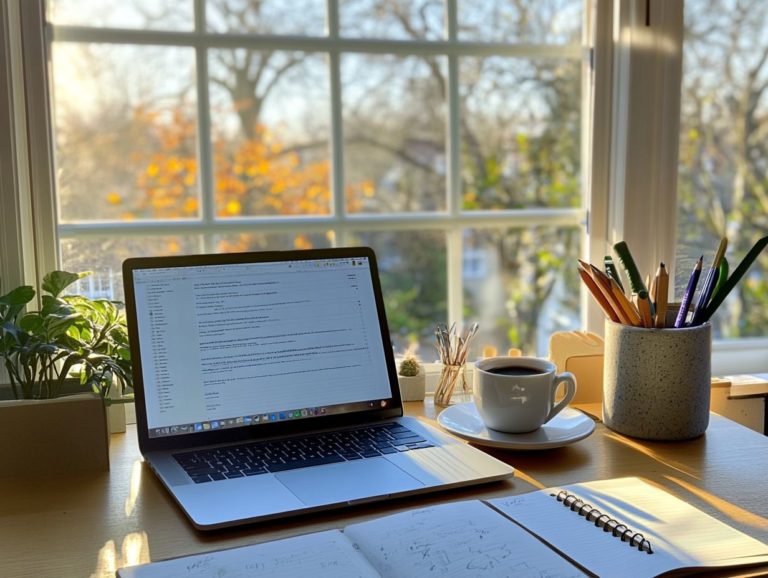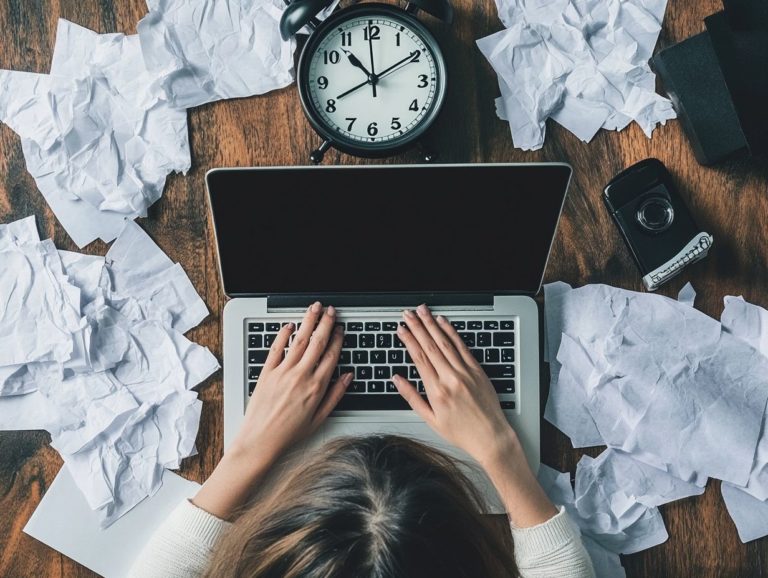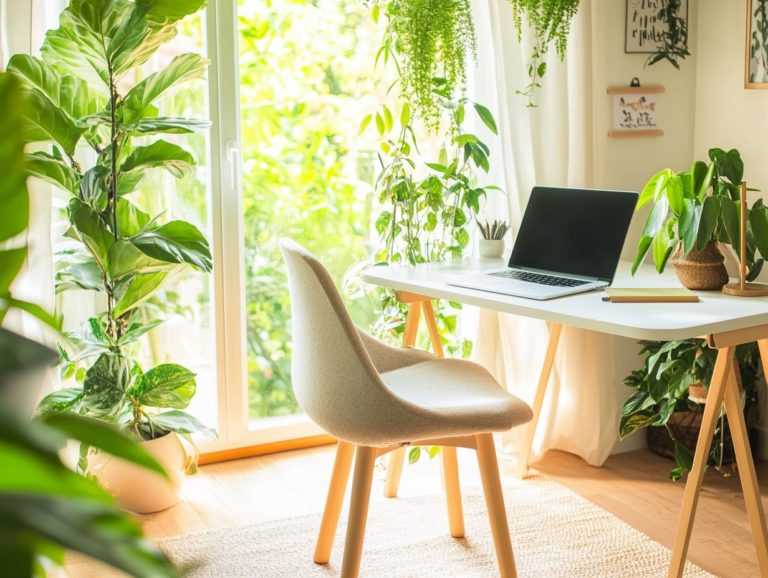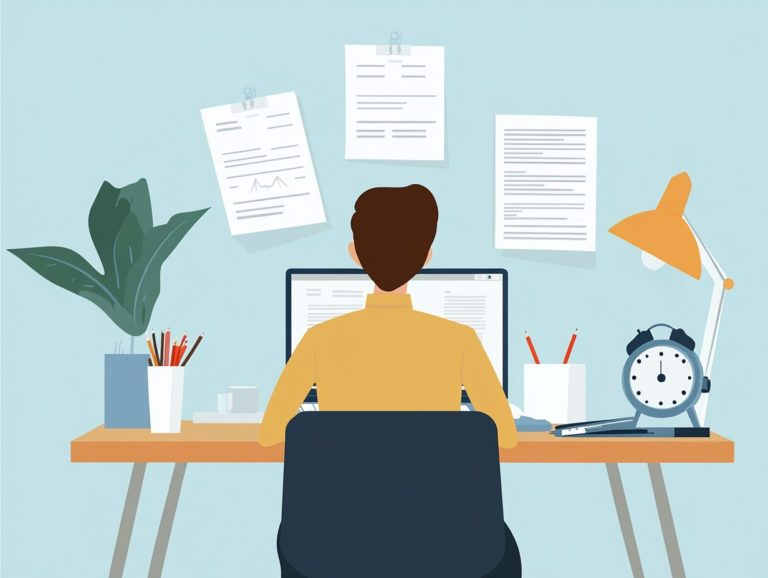The Influence of Environment on Procrastination
Procrastination is a challenge that many encounter, often presenting itself as a formidable barrier to productivity. Your environment significantly influences this struggle.
Let s dive into understanding procrastination and how it affects you. This exploration examines the various factors that contribute to procrastination and how your surroundings can either stifle or elevate your motivation.
Common distractions are identified, and practical tips are provided to help you cultivate a more productive space. By the conclusion, you will possess effective strategies to liberate yourself from procrastination and maximize your time.
Contents
- Key Takeaways:
- Understanding Procrastination
- The Impact of Environment on Procrastination
- Environmental Triggers for Procrastination
- Creating a Productive Environment
- Breaking the Procrastination Cycle
- Frequently Asked Questions
- What is the influence of environment on procrastination?
- How does the physical environment impact procrastination?
- Can social pressure contribute to procrastination?
- How can changing my environment help me overcome procrastination?
- Are there specific environmental factors that influence procrastination?
- How can I use my environment to stay motivated and avoid procrastination?
Key Takeaways:

- Procrastination is influenced by your surroundings.
- A messy environment can kill your focus.
- Creating a tidy workspace helps you stay on track.
Understanding Procrastination
Procrastination is a complex behavior that impacts many individuals, often resulting in adverse outcomes in both personal and academic domains. Defined by the tendency to postpone tasks or responsibilities, procrastination stems from a complex interplay of psychological traits, environmental factors, and even genetic influences.
This makes it a vital subject within the realms of psychology and time management. Gaining insight into procrastination is essential for enhancing your confidence in your abilities and boosting academic performance while cultivating a healthier relationship with tasks and deadlines.
Definition and Factors Contributing to Procrastination
Procrastination is essentially the voluntary decision to delay an intended action, even when you know it could lead to negative outcomes. It’s often tied to various psychological factors, including task aversion and struggles with self-regulation.
Personal traits like impulsivity and self-control, combined with external influences such as long deadlines and study environments, contribute to why many students find themselves caught in academic procrastination.
At its core, procrastination uncovers a labyrinth of cognitive biases. You might feel overly optimistic about your future performance while underestimating the time it will take to complete tasks. Certain personality traits, such as perfectionism, can worsen the situation, causing you to delay action until everything feels just right.
Genetics might also play a role; some individuals are predisposed to lower levels of self-discipline, which can lead to procrastination habits. Social pressures, competing commitments, and distractions complicate the situation further. Students often find themselves trapped in a cycle of delay that severely impedes their academic success.
The Impact of Environment on Procrastination
Your environment significantly influences procrastination behaviors, often serving as a catalyst for distractions that undermine your productivity and motivation. Understanding the impact of distractions on procrastination can help you identify elements such as clutter, noise levels, and even the presence of peers that can either amplify or alleviate your tendencies to procrastinate.
By recognizing these environmental factors, you can craft study spaces that foster self-regulation and diminish task aversiveness, ultimately boosting your academic performance. Start transforming your workspace today to beat procrastination!
How Surroundings Affect Motivation and Productivity

Your surroundings profoundly impact your motivation and productivity. A tidy, distraction-free environment can boost your focus and urgency.
Different settings provide unique influences on your ability to concentrate and feel driven. For instance, designated study spaces like libraries or quiet rooms instill a sense of purpose. In contrast, a comfortable home environment might inadvertently lull you into relaxation, which detracts from productivity.
Try these strategies to boost your focus:
- Minimizing digital distractions
- Utilizing specific d cor to inspire concentration
- Employing time management techniques, like the Pomodoro Technique (a time management method that breaks work into intervals, usually 25 minutes long, followed by short breaks), to instill a sense of urgency
By intentionally designing your spaces, you can transform your surroundings into powerful tools that enhance your motivation and maximize your productivity in academic pursuits.
Environmental Triggers for Procrastination
Environmental triggers play a crucial role in sparking procrastination behaviors. Various distractions can easily pull your focus away from essential academic tasks, leading to impulsive diversions.
Recognizing these triggers is vital for grasping how they contribute to procrastination, especially in academic environments where the aversion to certain tasks can be particularly strong.
Common Distractions and Temptations
Common distractions and temptations can easily derail your time management efforts and contribute to procrastination, especially in study environments. Whether it s the siren call of social media, the allure of video games, or other forms of entertainment, recognizing these distractions is essential for cultivating a focused and productive atmosphere conducive to your academic success.
You may also encounter interruptions from your surroundings like noisy roommates or cluttered study spaces that can impede your concentration. The relentless pings of notifications from your smartphone or the urge to check messages can further pull your attention from critical tasks.
Environmental factors like a chaotic desk or poor lighting can impact your focus. To combat these distractions, consider implementing specific strategies:
- Creating a dedicated study area that’s free from noise
- Scheduling regular breaks to manage your social media use
- Utilizing tools like time-blocking to organize your work effectively
By prioritizing a structured routine, you can significantly reduce procrastination and enhance your productivity.
Creating a Productive Environment
Creating a productive environment is crucial for minimizing distractions and maximizing your focus. This approach can significantly reduce procrastination and enhance your academic performance.
A well-organized space not only helps you stay focused but also fuels your motivation. It empowers you to tackle tasks with efficiency and confidence.
Tips for Minimizing Distractions and Maximizing Focus

To minimize distractions and maximize your focus, implementing strategic procrastination strategies is essential for effective time management and self-control. By prioritizing your tasks and creating a structured routine, you can significantly reduce the likelihood of procrastination and elevate your productivity.
One powerful approach is time-blocking: setting aside specific times to focus on one task. This allows for uninterrupted concentration. Set clear, achievable goals to stay directed and motivated, enabling you to break larger projects into smaller, manageable tasks.
Use productivity tools like task management apps to supercharge your efforts and keep your priorities in check! Cultivating self-discipline is crucial. Regularly review your progress and adjust your plans to foster a proactive mindset, which is key to overcoming the temptations of distraction and procrastination.
Breaking the Procrastination Cycle
Breaking the procrastination cycle demands a comprehensive approach that weaves together effective strategies and supportive learning techniques to address challenges in managing your time and tasks. By identifying the triggers and underlying factors that contribute to procrastination, you can craft targeted interventions that enhance your time management skills and elevate your academic performance.
Strategies for Overcoming Procrastination Habits
Overcoming procrastination habits requires you to employ effective strategies that enhance your self-regulation and refine your time management skills. This ultimately boosts your confidence in completing academic tasks. Dive into the underlying factors that contribute to your procrastination to adopt tailored approaches that nurture consistent productivity.
One particularly effective strategy is to enlist accountability partners. Sharing your goals and progress with someone else offers that extra layer of motivation and support you might need. Set clear, achievable deadlines for both long-term projects and daily tasks to create a sense of urgency that propels you into action.
Utilizing procrastination assessment tools allows you to pinpoint specific triggers and patterns in your behavior, enabling you to devise targeted strategies for improvement. Believe in yourself! Your confidence can skyrocket your motivation and help you tackle procrastination challenges!
Frequently Asked Questions
What is the influence of environment on procrastination?

Your environment plays a huge role in procrastination. Distractions from your surroundings, including social platforms, can lead to task delays and unproductive behaviors, as outlined in the influence of social media on procrastination habits.
How does the physical environment impact procrastination?
The physical environment, such as a cluttered workspace or a noisy setting, can create distractions and make it difficult to focus on tasks, leading to procrastination. Conversely, a calm and organized environment can promote productivity and, as outlined in the role of community in reducing procrastination, help foster a supportive atmosphere that encourages getting things done.
Yes, social pressure can be a significant influence on procrastination. If an individual is surrounded by peers who also procrastinate, it can create a norm of delay and make it easier for them to justify their own procrastination behaviors.
How can changing my environment help me overcome procrastination?
Changing your environment can help you overcome procrastination by eliminating distractions, creating a more conducive space for productivity, and breaking the cycle of procrastination. For example, if you usually work in a loud and chaotic environment, try finding a quiet and organized space to complete your tasks.
Start implementing these strategies today, and watch your productivity soar!
Are there specific environmental factors that influence procrastination?
Research shows that your workspace design, noise levels, and visual distractions significantly impact procrastination.
Social pressure and the expectations of others also play a role in procrastination behavior.
How can I use my environment to stay motivated and avoid procrastination?
Create a productive environment to boost your motivation and fend off procrastination.
This includes establishing a designated workspace, eliminating distractions, and using motivational tools like a vision board or inspirational quotes.






